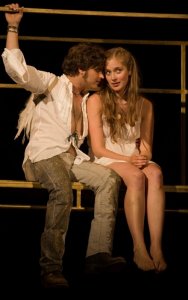Provocative, Unadulterated Romeo and Juliet to the Extreme
Hot- Romeo & Juliet
- by William Shakespeare
- Shakespeare Santa Cruz
- July 16 - August 31, 2008
| Acting |  |
| Costumes |  |
| Sets |  |
| Overall |  |
About a million hyperbolous years ago, a grad school professor I was assisting told me that one of the great tragedies in Romeo and Juliet is the fact that the adults in the play fail the children—everyone from parents to nurse, friars to prince—the adults neither listen to nor take the children in the play seriously. He was also the first professor to take and teach the lovers’ plight with some import. Since then, I’ve been searching for a staging that does the same. Until now, both Romeo and Juliet have been presented to me as spoiled, juvenile, or whiny stomping ‘round the stage adolescents. Their story has been littered with condescending images of puppy love and teenage growing pains. For anyone who’s ever felt the pangs of love, let alone love that is forbidden, the emotions involved run deep—even on a good day. In director Kim Rubinstein’s production of Romeo and Juliet, staged by Shakespeare Santa Cruz in the midst of the Sinsheimer-Stanley Festival Glen redwoods, I’ve finally found what I’ve been looking for all these years.
Rubinstein calls upon her Hungarian heritage, setting our lovers in a “fabled Budapest” complete with gypsies, musicians and fortune tellers in order to underscore this play’s theme of exile. Set Designer Erhard Rom places Juliet in a more traditional, well-to-do Hungarian household, the stage set with a flowered balcony above the pillared floor. Scaffold stairways left and right are connected by a thoroughfare on which our lovers will embrace in a most tender moment and most passionate kiss—the kind of kiss that leaves your foreheads touching as your mouths come up for air. You’ll follow Romeo and his lost boys into the forest stage right, in which Romeo’s tree house is planted in the middle of several towering redwoods—a studio slum with makeshift wind chimes, a metal bucket, a bird cage and a single red rose hanging without. The rest of the forest glen not occupied by the audience is overrun by Romeo’s swashbuckling gypsy cronies, led by Stephen Bel Davies whose Mercutio is exciting, provocative, and every bit as mercurial as he should be.
Adolescence is not ruled out of this production. That would be just plain silly. We meet Juliet in a pair of Converse, dancing by herself as though no one is looking. Caitlin FitzGerald is playful, thoughtful, innocent and naïve without being unsophisticated. She carries a natural beauty with a freedom that requires no time in hair and make up, and rawness in her acting that enchants with believability. There’s a sense that up until now, Juliet has not had a care in the world, perhaps a deduction made after watching her Nurse (Saundra McClain) with the help, but mostly observation, of Lady Capulet (Yvonne Woods) perform Juliet’s daily grooming for her. The casually staged scene is hysterical as the limp and ragdollish FitzGerald sits in her chair center stage while McClain shaves young Juliet’s legs, brushes her teeth, and so on. This proves almost as funny and odd as FitzGerald’s perfectly awkward karaoke of “Dream a Little Dream" complete with back up singers to kick off the masquerade. And our dark and melancholic Romeo goes through all the moans and groans you would expect over the fair Rosaline, yet Charles Pasternak has a bad boy edge that’s daring and fearless and sexy as hell, as well as an excellently imposed Brit boy accent leaving me shocked to read Pasternak hails from LA. Pasternak and FitzGerald are electrifying. They are Romeo and Juliet in the most desperate and beautiful way. Andre Pluess has created a sweet and tender piece of music that accompanies the lovers throughout the production, composed of the melodic line of a violin with a piano playing a simple arpeggiated chord (think variation on the first movement of Beethoven’s "Moonlight Sonata"). When Pasternak and FitzGerald’s eyes meet for the first time, the action on the stage around them slows in motion, creating a moment in time. Pluess’ accompaniment creates the same affect over and over again.
As Juliet’s Nurse, McClain is hearty and endearing; a storyteller and a fortuneteller hailing from some gypsy clan before coming to the Capulet household with a pipe in her hand and a flask in her pocket. McClain is accompanied by Mick Mize as Peter, who has a stool strapped to his back and has finagled a way to permit those he encounters to sit on the stool without undoing it from his back. The trick is genius and hysterical, as is Mize in his clownish role.
As Juliet relies on her Nurse for comfort and guidance, Romeo looks to Friar Laurence (Richard Farrell), who, dressed in a beaded vest with sandaled feet, picks through the herbs he’s gathered for the day. McClain and Farrell open the play by speaking the Prologue to the audience. They press the young and lusty lovers through the rituals of their marriage ceremony without considering and enforcing the repercussions of the action. They fail Romeo and Juliet in their time of need, and take the brunt of the blame in the end as they stand around the dead lovers in their eternal embrace. We don’t see much of Romeo’s parents, which is telling in itself. Lord and Lady Capulet, played by John Pribyl and Yvonne Woods, are quick and severe in their encounters with Juliet—Woods, a society woman in a tailored ruby red suit on her lean, statuesque form, a piled high tight bun, and perfect makeup that never cracks with emotion. To her lack of emotion, Pribyl is fiery and explosive and even abusive to his disobeying daughter. Neither are good listeners.
Much like Shakespeare had to kill off Falstaff in order to make way for King Henry V, we must lose Mercutio in order hand the spotlight and the tragic ending to Romeo and Juliet. Bel Davies makes this a tough torch to pass. Bel Davies’, along with Ross Crain, Grayson DeJesus, and Adam Schroeder, make up Romeo’s hell raising and swaggering gypsy band of friends (I’m not forgetting about Benvolio, but more on that later), their perfect bodies clad in low rise, tight-fitting and belted pants, skimpy and backless vests, no shirts, looking like a cross between gypsy and pirate. Bel Davies is a standout. His voice has a biting and sarcastic tone, and his antics are mesmerizing if not flamboyant right down to the way he stands on the stage. The name Mercutio stems from the word mercurial, accounting for his quick wit, but also for his volatile, changing and erratic behavior. Many times, Bel Davies will stand in silence slightly off from the rest in a moment of deep and troubling thought, and then quickly snap into his comedic and sharp tongued role. His personality disorder leads to his excellently staged duel with the fiery Tybalt (David Arrow), and his death scene is even more heartbreaking as it is executed within sight of the audience. We’re even permitted time to mourn his loss, as his lifeless body remains in view during the brutal, even exaggerated slaying of Tybalt, and the banishment of Romeo. The sense of extremes permeates this production, with Rubinstein calling up the gypsy notion of Sevdah, which she explains is “an orgiastic celebration…a state of extreme exaltation and deep sadness at the same time, wildly expressed through dancing, shouting, breaking bottles, the spilling of blood… (and in its most extreme form), suicide.” Just as Juliet’s love is “as boundless as the sea,” other actions and emotions are just as extreme and left unmoderated.
Though not necessarily miscast, Jon Gentry as Paris seems to be misdirected. Perhaps the point is to express how poor a match Paris is for Juliet, but Gentry’s weak presence and booty dance during the Capulet’s masquerade seems a distracting misstep toward unnecessary and forced comedy. It also makes poor Gentry a standout to the other extreme, as the rest of the cast are perfectly on point.
I’ve never really given much thought to Romeo’s cousin, Benvolio, but this production has changed all that, leading me to reread the play with him in mind. Erik Hellman portrays Benvolio as the only voice of reason in the play. The text accounts for this, with Benvolio acting sort of like Hamlet’s Horatio by recapping events as well as offering advice to Romeo. He is also the only character in the play with which Romeo talks seriously. Benvolio listens. Hellman is part of Mercutio’s crew, but he looks and dresses differently, and is the least volatile and the most reasonable character on stage. In Shakespeare’s text, Benvolio exits the play after explaining how it is Mercutio and Tybalt are slain. In this production he returns. After Romeo and Juliet’s heartbreaking and anxiety-inducing death scene, Hellmen can be seen in a glowing spotlight sitting in the cradling branches of the redwoods surrounding Romeo’s treehouse. He holds his knees in silence, but his face is burdened and in despair. This interpretation adds depth and longevity to a production we all know, cast with characters who have defined roles and endings. Here, Benvolio remains the most provocative of the bunch.
So I’m thrilled to have, after all these years, found the production I’ve been searching for and so much more. Maybe it’s a Santa Cruz thing, as that professor (Bruce Avery) way back when received his Ph.D. at UCSC during his own million hyperbolous years ago. Speaking of nostalgia, I can’t help but believe that this production’s little bit of added panache comes by way of SSC’s new Artistic Director, Marco Barricelli. Many of you know Barricelli from his eight seasons with San Francisco’s American Conservatory Theatre. Some go back a little farther and followed him through his eight seasons at the Oregon Shakespeare Festival. His professional career is expansive, with Barricelli wearing many different hats for acting, directing, and teaching over his twenty-plus years in theatre. I began my one-sided love affair only two years ago when I saw him play Cyrano in a one-season rave review return to OSF in 2006. He and his white plume remain unforgettable. Look for the white plume in this production of Romeo and Juliet and you tell me if this isn’t perhaps Barricelli’s subtle signature on his inaugural season at Shakespeare Santa Cruz.
Discuss this review or play in our forums
Reviews on this site are subject to this required disclosure.















